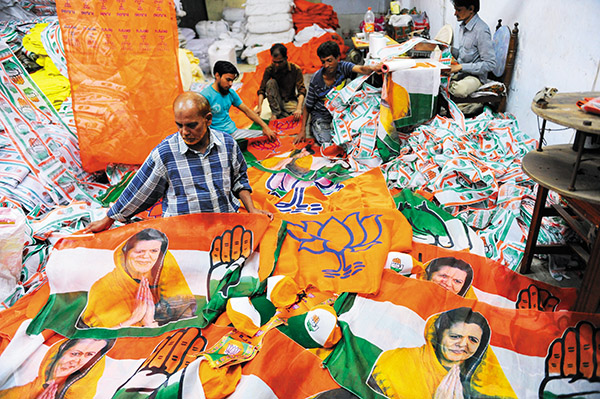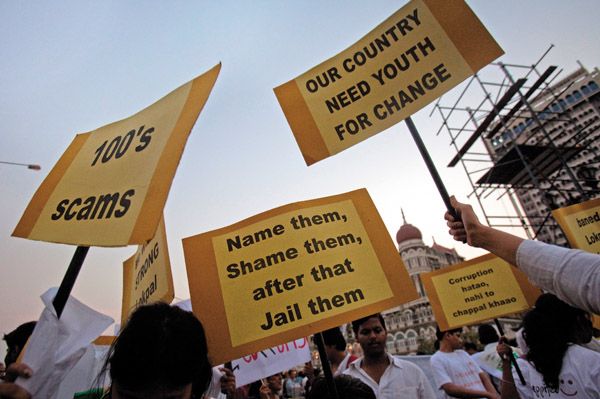By resisting reforms and efforts to introduce transparency in their functioning, the political establishment is defeating the purpose of democracy
 |
Jagdeep S Chhokar
Profile: Jagdeep S Chhokar is founder and trustee of Association for Democratic Reforms (ADR). He has been central to ADR’s success in bringing political parties under the ambit of RTI and the Supreme Court ruling barring convicted criminals from contesting elections. He is a former professor, dean, and director in-charge of IIM-A.
The question asked in the title of this piece is obvious, even embarrassing. But it is unequivocal. It says, without any hesitation, that our political process produces rotten leaders and corrupt folk. This is a strong statement, but true. The more complex question is: Why? The answer is not easy but I will attempt an answer. But first, a clarification: The title does not apply to all political leaders; obviously there are exceptions, politicians who are not rotten or corrupt; but those are few and far between.
Now it is quite common to put the entire blame of the current state of affairs on the so-called political class. But those who would have us believe that all that is wrong has been caused by the political class overlook the fact that it does not exist or develop in vacuum; it emerges and evolves out of society. Therefore, society at large, of which all of us are a part, cannot escape responsibility. However, the political class cannot be entirely absolved of it either.
I will come to this later but first, as a student of human behaviour for over 40 years, I would like to suggest that a substantial part of the behaviour of the political class can be explained as a logical response to the broader social system within which they have to operate. The political and electoral aspects form a major and immediate component of this system that applies to them.
The link between common citizens and individual politicians is mediated by the political parties. It is obvious that a democracy—particularly a parliamentary and a representative democracy—is inconceivable without political parties. Even the Supreme Court has said that political parties are integral to the governance of a democratic society. They perform the critical function of mobilising and organising public opinion, and function as a link between the public at large and the government, particularly its political wing.

A democratic political system is inconceivable without parties
Some of us might find it surprising that the term ‘political parties’ is not to be found in the Constitution that came into effect on January 26, 19501 . India has the longest written constitution in the world and it is completely silent on the issue of functioning of political parties. We may wonder why the Constituent Assembly did not deem it necessary to mention anything about this. In my opinion, this is because the Constitution was drafted by a group of principled and high-minded people. In their deliberations for the future of the nation, they were perhaps influenced by their idealism, particularly in the immediate after-glow of independence. I assume they must have thought that people similar to them will lead the country even in the years to come.
The Indian genius has certainly evolved over the last 60-plus years and, at least in some ways, the socio-political milieu has changed almost beyond recognition. Some of the assumptions and expectations of the members of the Constituent Assembly are, therefore and unfortunately, not valid today.
The appropriate question to ask, therefore, is “What is wrong with our political system?” The direct answer is: The way our political parties function.
 |
|
Image: Reuters
|
|
Demonstrations against corruption among the political classes has been increasing in the past few ye
|
While political parties are the pillars on which the entire structure of the ‘democracy’ rests and works, and political parties never tire of claiming to be defenders of democracy, it is ironic that none of them is truly democratic in its internal functioning. It is this anomaly that made the Law Commission of India write the following in its 170th report titled ‘Reform of the Electoral Laws’ submitted to the government in May 1999: “On the parity of the above reasoning, it must be said that if democracy and accountability constitute the core of our constitutional system, the same concepts must also apply to and bind the political parties which are integral to parliamentary democracy. It is the political parties that form the government, man the Parliament and run the governance of the country. It is, therefore, necessary to introduce internal democracy, financial transparency and accountability in the working of the political parties. A political party which does not respect democratic principles in its internal working cannot be expected to respect those principles in the governance of the country. It cannot be dictatorship internally and democratic in its functioning outside.” (Para 3.1.2.1; italics added.)
The report has been around for almost 14 years but nothing has been done. On the other hand, every single effort to introduce some transparency is strongly opposed by the entire political system.
For example, political parties first prevented the income tax (IT) department from providing copies of their returns in response to a request under Right to Information (RTI) Act from a civil society group, Association for Democratic Reforms (ADR). Then they contested the appeal that ADR filed in the Central Information Commission (CIC). The CIC finally decided in 2008, after a two-year struggle, to make the IT returns public.
The latest example is the CIC decision of June 3, 2013, declaring six national political parties to be “public authorities” under the RTI Act. This was because they wanted parties to fulfil all the conditions laid down in Section 2(h) of the RTI Act, which gives the definition of a public authority. There has been a hue and cry about it. There were reports that the RTI Act will be amended by issuing an Ordinance which, according to Article 123 (1) of the Constitution, is to be issued when both Houses of Parliament are not in session, and “the President is satisfied that circumstances exist which render it necessary for him to take immediate action”. The key words are “necessary” and “immediate”. This proposal seems to have been dropped and there are reports that the RTI Act will be amended in the forthcoming session of Parliament.
These examples show how the political establishment resists reform. It seems there is comfort in familiarity and fear of the unknown, or “a known devil is better than an unknown devil”.
Politicians seem to think that any change in the current political system may have unforeseen outcomes which may be unpleasant to them personally.
The political class has to realise that it is in their own interest to initiate real and effective changes because the status quo is not going to be acceptable to citizens at large, as events of the last couple of years have amply demonstrated. What is needed is legislation on how a political party should function. The Parliament is free to pass whatever it thinks appropriate but once it does so, all political parties will have to observe and honour it, and not try to amend it each time, as they are now trying to do with the RTI Act

